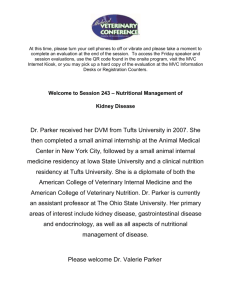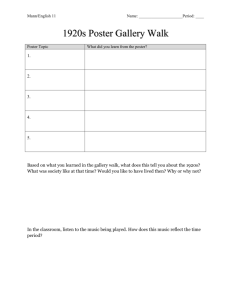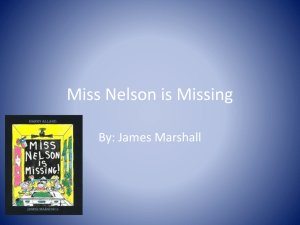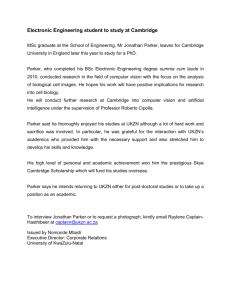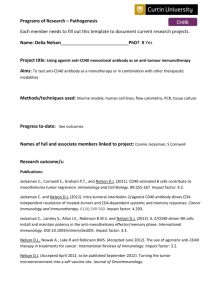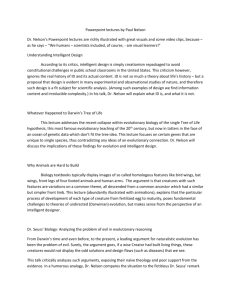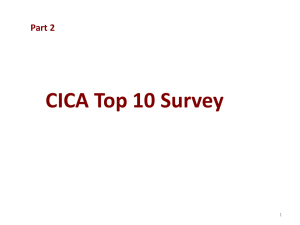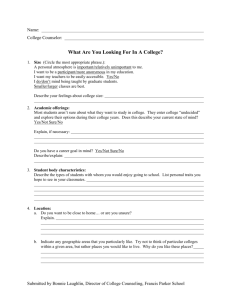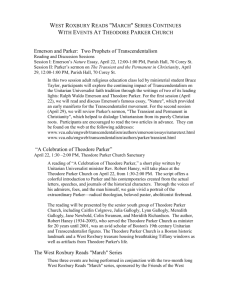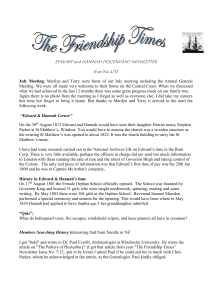Feb 1 Hope
advertisement
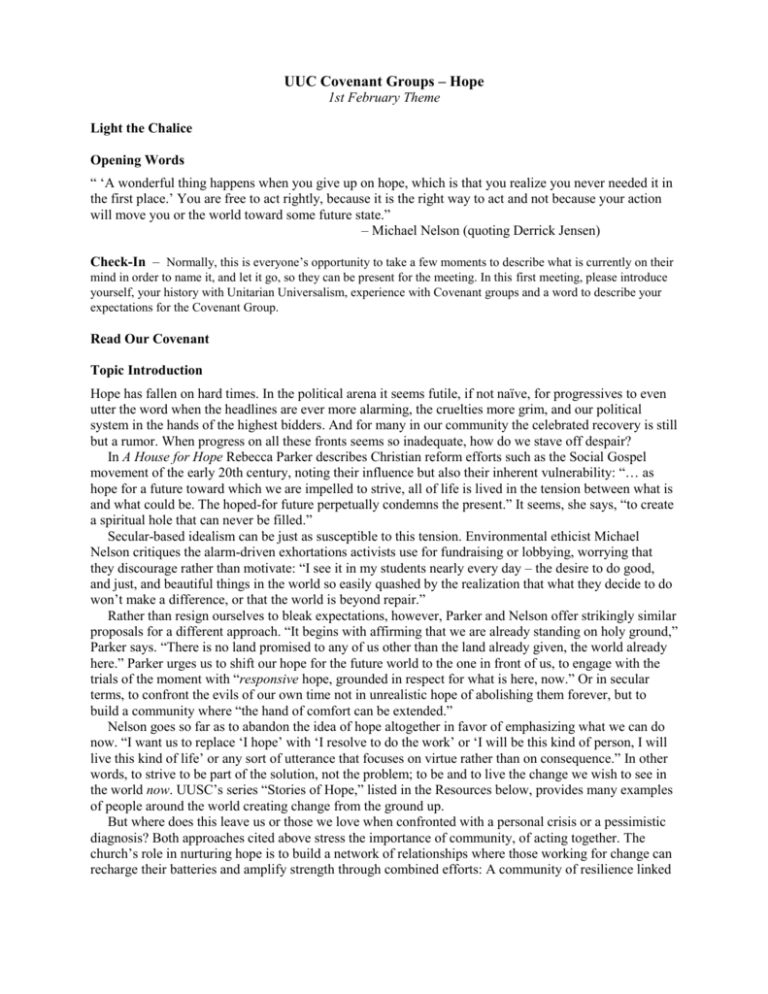
UUC Covenant Groups – Hope 1st February Theme Light the Chalice Opening Words “ ‘A wonderful thing happens when you give up on hope, which is that you realize you never needed it in the first place.’ You are free to act rightly, because it is the right way to act and not because your action will move you or the world toward some future state.” – Michael Nelson (quoting Derrick Jensen) Check-In – Normally, this is everyone’s opportunity to take a few moments to describe what is currently on their mind in order to name it, and let it go, so they can be present for the meeting. In this first meeting, please introduce yourself, your history with Unitarian Universalism, experience with Covenant groups and a word to describe your expectations for the Covenant Group. Read Our Covenant Topic Introduction Hope has fallen on hard times. In the political arena it seems futile, if not naïve, for progressives to even utter the word when the headlines are ever more alarming, the cruelties more grim, and our political system in the hands of the highest bidders. And for many in our community the celebrated recovery is still but a rumor. When progress on all these fronts seems so inadequate, how do we stave off despair? In A House for Hope Rebecca Parker describes Christian reform efforts such as the Social Gospel movement of the early 20th century, noting their influence but also their inherent vulnerability: “… as hope for a future toward which we are impelled to strive, all of life is lived in the tension between what is and what could be. The hoped-for future perpetually condemns the present.” It seems, she says, “to create a spiritual hole that can never be filled.” Secular-based idealism can be just as susceptible to this tension. Environmental ethicist Michael Nelson critiques the alarm-driven exhortations activists use for fundraising or lobbying, worrying that they discourage rather than motivate: “I see it in my students nearly every day – the desire to do good, and just, and beautiful things in the world so easily quashed by the realization that what they decide to do won’t make a difference, or that the world is beyond repair.” Rather than resign ourselves to bleak expectations, however, Parker and Nelson offer strikingly similar proposals for a different approach. “It begins with affirming that we are already standing on holy ground,” Parker says. “There is no land promised to any of us other than the land already given, the world already here.” Parker urges us to shift our hope for the future world to the one in front of us, to engage with the trials of the moment with “responsive hope, grounded in respect for what is here, now.” Or in secular terms, to confront the evils of our own time not in unrealistic hope of abolishing them forever, but to build a community where “the hand of comfort can be extended.” Nelson goes so far as to abandon the idea of hope altogether in favor of emphasizing what we can do now. “I want us to replace ‘I hope’ with ‘I resolve to do the work’ or ‘I will be this kind of person, I will live this kind of life’ or any sort of utterance that focuses on virtue rather than on consequence.” In other words, to strive to be part of the solution, not the problem; to be and to live the change we wish to see in the world now. UUSC’s series “Stories of Hope,” listed in the Resources below, provides many examples of people around the world creating change from the ground up. But where does this leave us or those we love when confronted with a personal crisis or a pessimistic diagnosis? Both approaches cited above stress the importance of community, of acting together. The church’s role in nurturing hope is to build a network of relationships where those working for change can recharge their batteries and amplify strength through combined efforts: A community of resilience linked with many others, addressing a wide variety of needs. A community of caring, so that when personal struggles overtake anyone within its radius of awareness, the hand of comfort will be ready. Questions for Discussion 1. Is hope still a viable concept for you? Why or why not? If yes, from what sources do you draw it? 2. The opening words are deliberately provocative. While they seem to negate the idea of hope altogether, they can also be read as a shift of emphasis, from the impossible to the do-able. How does looking at hope through that lens affect your capacity for it? 3. Does your work in the community feel fulfilling, or does it leave you with a sense that it is never enough? What are some ways to address that? 4. The Social Gospel movement that Parker discusses inspired people to become involved with urban social work and conditions affecting immigrants. If you are familiar with other early reform efforts (such as abolition of slavery, women’s suffrage, child labor laws, for example), how does that affect your views toward ongoing progress? 5. Do personal struggles affect your energy in responding to community and world issues – or vice versa? What are some ways to manage that balance? 6. If current events or personal struggles have eroded hope for you, how could our UUC community help “recharge your batteries”? How can we make this congregation a community that can extend the hand of comfort for all of us? Closing Words “Never doubt that a small group of thoughtful, committed citizens can change the world. Indeed, it is the only thing that ever has.” – Margaret Mead “My heart is moved by all I cannot save: So much has been destroyed. I have to cast my lot with those who, age after age, perversely, with no extraordinary power, reconstitute the world.” – Adrienne Rich Check-Out – The check-out is also brief. It can be a closing comment, describing a new insight or learning, or words of gratitude. Extinguish the Chalice Resources: John Buehrens and Rebecca Parker. A House for Hope. Boston: Beacon Press, 2010. Derrick Jenson. “Beyond Hope.” Orion, May/June 2006. Michael P. Nelson. “To a future without hope.” In: Moral Ground, Ethical Action for a Planet in Peril, Kathleen Dean Moore and Michael P. Nelson, eds. Trinity University Press, 2011. Excerpts at: http://moralground.com/ Unitarian Universalist Service Committee. “Stories of Hope.” http://67.225.131.93/publications/60/stories_of_hope

